1920s
The Bible Diet

The spiritual nourishment was too rich for this boy's system.
Source: Florence Morning News - Jan 9, 1926.
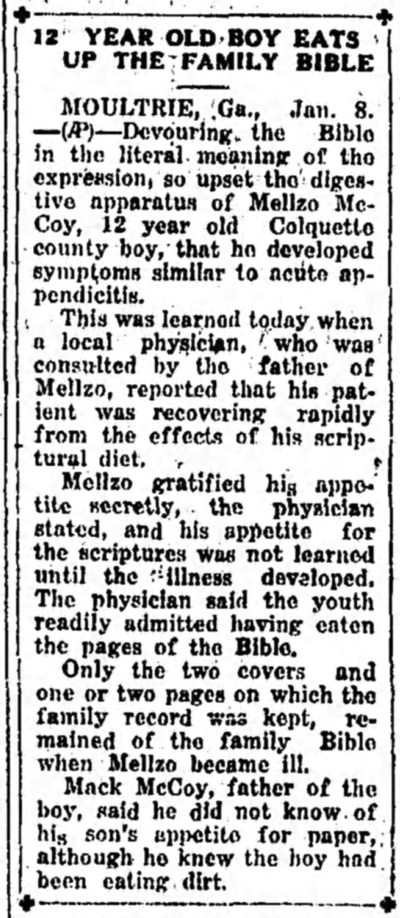
More in extended >>
Posted By: Alex - Mon Jul 13, 2015 -
Comments (6)
Category: Food, Religion, Books, 1920s
Killed by falling tombstone
People who manage to get killed while digging graves for others seems to be a recurring theme in weird news. Here's an example from 1925: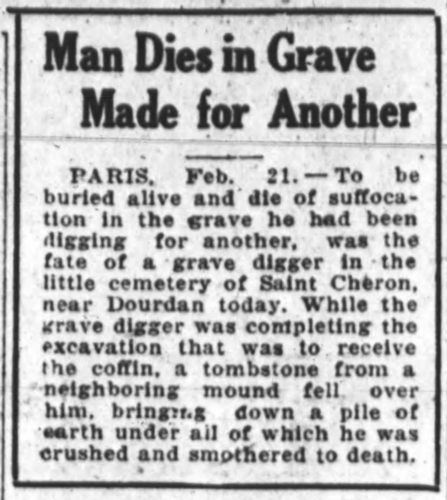
Source: The Ottawa Journal - Feb 21, 1925
Posted By: Alex - Thu Jun 18, 2015 -
Comments (7)
Category: Death, 1920s
Chief Os-ko-mon, Broadway Star
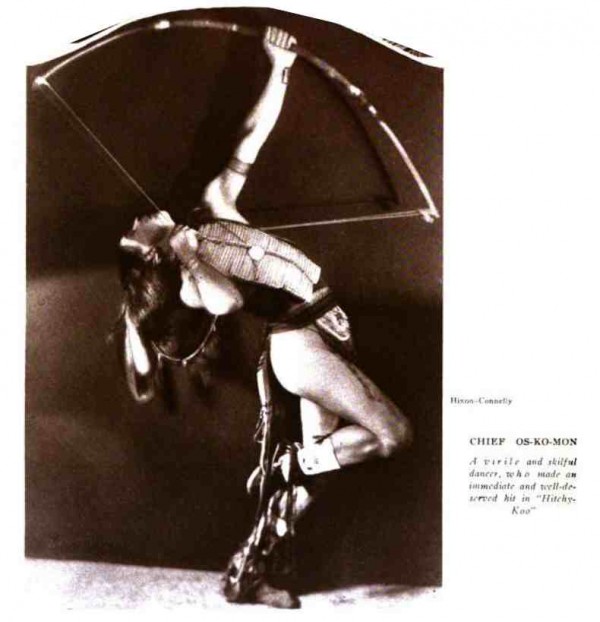
Can we really believe that the Broadway producer behind the HITCHY-KOO REVUE really enlisted an actual Native American into his troupe? Or that the Chief later appeared in another variety show?

And yet the noble Chief Os-ko-mon seems to have actually recorded a record or two. And in this essay, he is deemed a member of the Yakima tribe.
I toss out the question of his legitimacy to all WU-vies. Should he not be recorded as an early stalwart of Native American achievements, Broadway-style?
Posted By: Paul - Tue Jun 16, 2015 -
Comments (3)
Category: 1920s, Actors, Native Americans
Doing the Charleston
1927: 10-year-old Mildred Unger dances the Charleston on the wing of an airplane, while it's flying in the air.
Posted By: Alex - Mon Jun 01, 2015 -
Comments (4)
Category: Air Travel and Airlines, 1920s, Dance
Mystery Gadget 26
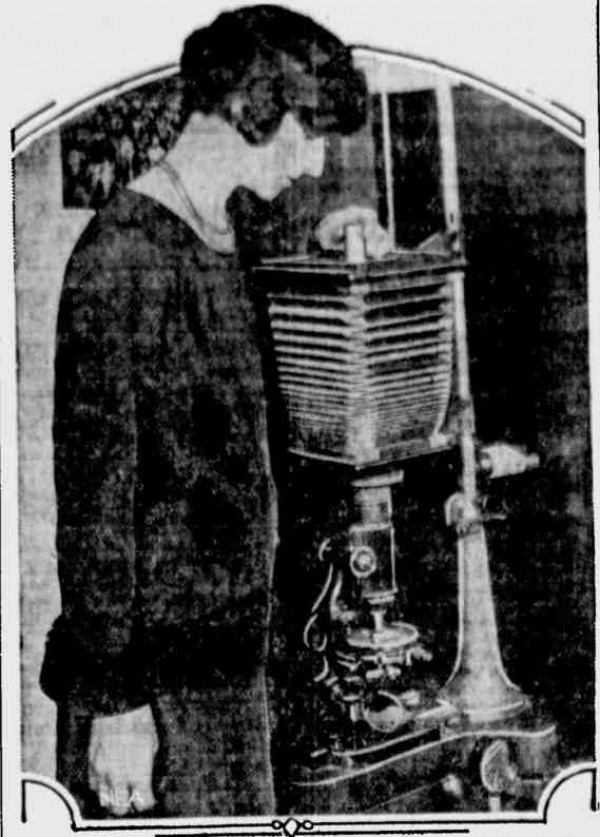
What's it do? The answer is here.
Posted By: Paul - Wed Apr 22, 2015 -
Comments (5)
Category: Technology, 1920s
Pajamas as Streetwear: 1929
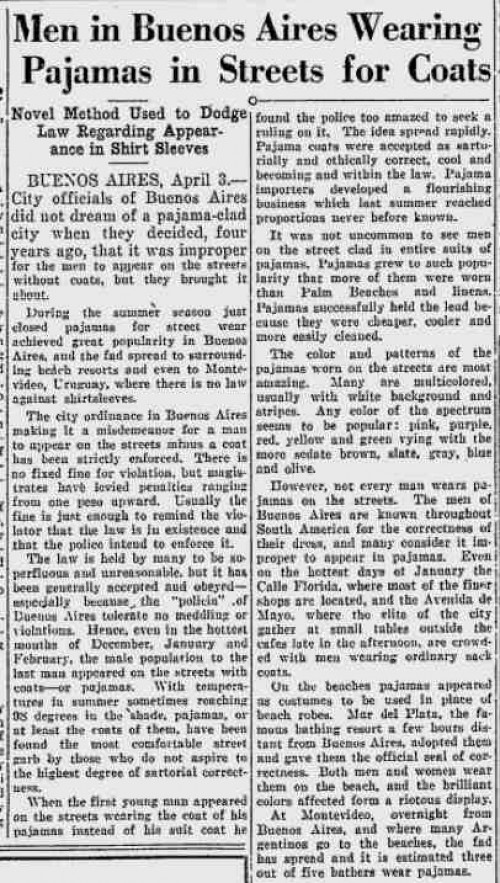
These kids in 2015, wearing pj's to class!
Posted By: Paul - Thu Apr 02, 2015 -
Comments (4)
Category: Beauty, Ugliness and Other Aesthetic Issues, Fashion, 1920s, South America
Imperishable Burial Robes
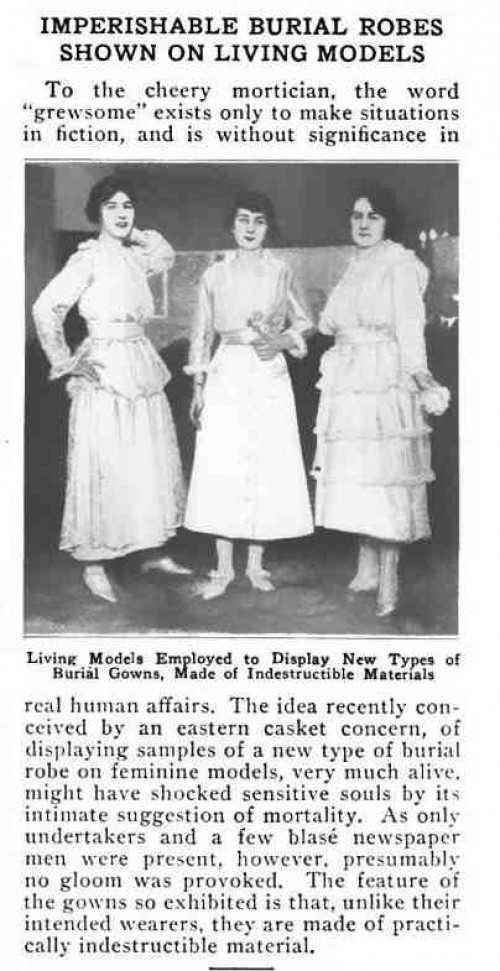
Alex gave us green burials--here's the opposite! Keep your corpse looking fresh, stylish and whole!
Original article here.
Posted By: Paul - Mon Mar 30, 2015 -
Comments (3)
Category: Beauty, Ugliness and Other Aesthetic Issues, Body, Death, Fashion, Body Fluids, 1920s
Violet Rays
Good thing they clarified that this was NOT a vibrator. Otherwise someone might have gotten hurt.
Source: Illustrated World, March 1920.
Posted By: Alex - Wed Mar 18, 2015 -
Comments (5)
Category: Medicine, 1920s
Losing 103 lbs to Music!
Mrs. Derby suffered from a "mountainous burden of flesh," but when the music started to play, the pounds just melted away.
Source: The Ladies Home Journal, Nov. 1922
Posted By: Alex - Sat Mar 14, 2015 -
Comments (6)
Category: Advertising, 1920s
Baby Cage
Problem: It's hard to travel with a baby.Solution: build a portable cage to carry your kid in. I wonder if the TSA would approve of these. Source: Illustrated World (Mar 1920).

Posted By: Alex - Sat Jan 24, 2015 -
Comments (7)
Category: Babies, Family, Babies and Toddlers, Parents, 1920s

| Who We Are |
|---|
| Alex Boese Alex is the creator and curator of the Museum of Hoaxes. He's also the author of various weird, non-fiction, science-themed books such as Elephants on Acid and Psychedelic Apes. Paul Di Filippo Paul has been paid to put weird ideas into fictional form for over thirty years, in his career as a noted science fiction writer. He has recently begun blogging on many curious topics with three fellow writers at The Inferior 4+1. Contact Us |




